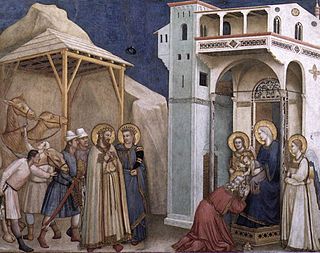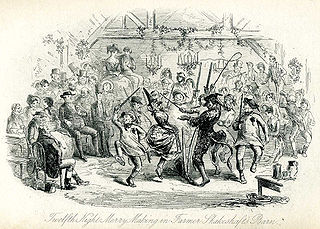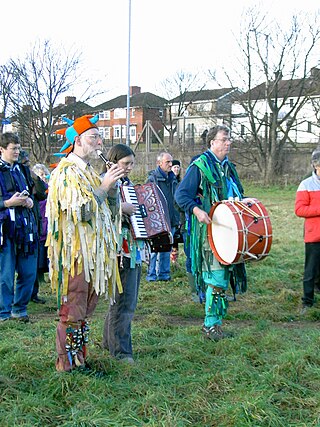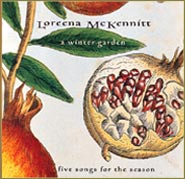Related Research Articles

Loreena Isabel Irene McKennitt is a Canadian singer-songwriter, multi-instrumentalist, and composer who writes, records, and performs world music with Celtic and Middle Eastern influences. McKennitt is known for her refined and clear soprano vocals. She has sold more than 14 million records worldwide.

"Good King Wenceslas" is a Christmas carol that tells a story of a tenth century Bohemian king who goes on a journey, braving harsh winter weather, to give alms to a poor peasant on the Feast of Stephen. The Feast of Stephen is December 26, the Second Day of Christmas in Western Christianity. In Eastern Christianity, it is December 27. [Need further clarification on whether it was celebrated on Dec 26 or 27 in Wencesalas's lifetime and region.] During Wenceslas's time, the Julian Calendar was in use. During the 900s, the day that they called December 26 was actually December 31 according to the Gregorian Calendar. And the day that they called December 27 was January 1.

The Twelve Days of Christmas, also known as the Twelve Days of Christmastide, are the festive Christian season celebrating the Nativity.

Christmastide, also known as Christide, is a season of the liturgical year in most Christian churches.

Twelfth Night is a Christian festival on the last night of the Twelve Days of Christmas, marking the coming of the Epiphany. Different traditions mark the date of Twelfth Night as either 5 January or 6 January, depending on whether the counting begins on Christmas Day or 26 December. January 6 is celebrated as the feast of Epiphany, which begins the Epiphanytide season.

Wassail is a beverage made from hot mulled cider, ale, or wine and spices, drunk traditionally as an integral part of wassailing, an ancient English Yuletide drinking ritual and salutation either involved in door-to-door charity-giving or used to ensure a good harvest the following year.

The tradition of wassailing falls into two distinct categories: the house-visiting wassail and the orchard-visiting wassail. The house-visiting wassail is the practice of people going door-to-door, singing and offering a drink from the wassail bowl in exchange for gifts; this practice still exists, but has largely been displaced by carol singing. The orchard-visiting wassail refers to the ancient custom of visiting orchards in cider-producing regions of England, reciting incantations and singing to the trees to promote a good harvest for the coming year. Notable traditional wassailing songs include "Here We Come a-Wassailing", "Gloucestershire Wassail", and "Gower Wassail".

To Drive the Cold Winter Away is Canadian musician Loreena McKennitt's second studio album, released in 1987. It pays homage to her childhood memories of music for the winter season, the most vivid of which "came from songs and carols recorded in churches or great halls, rich with their own unique ambience and tradition."
"The Death of Queen Jane" is an English ballad that describes the events surrounding the death of a Queen Jane. It is catalogued by Francis James Child as Child #170. Some of the versions given are Scottish, in which the queen's name is Jeanie or Jeany.
Here We Come A-wassailing, also known as Here We Come A-Christmasing,Wassail Song and by many other names, is a traditional English Christmas carol and New Year song, typically sung whilst wassailing, or singing carols, wishing good health and exchanging gifts door to door. It is listed as number 209 in the Roud Folk Song Index. Gower Wassail and Gloucestershire Wassail are similar wassailing songs.

"The Seven Joys of Mary" is a traditional carol about Mary's happiness at moments in the life of Jesus, probably inspired by the trope of the Seven Joys of the Virgin in the devotional literature and art of Medieval Europe. Though not traditionally associated with Christmas, it has become so in the modern era.

Holy Heathens and the Old Green Man is an album by Waterson–Carthy.
The Wexford Carol or the Enniscorthy Carol is a traditional religious Irish Christmas carol originating from Enniscorthy in County Wexford. The subject of the song is the nativity of Jesus Christ.
Nowell Sing We Clear is a previously four-member musical group that performs an annual yuletide concert series. They have also released a series of related albums.

A Winter Garden: Five Songs for the Season is an extended play (EP) by Loreena McKennitt. Recorded and released in 1995, it contains five tracks: three Christmas carols, McKennitt's adaptation of Archibald Lampman's poem "Snow", and the traditional English "Seeds of Love."

A Midwinter Night's Dream is the eighth studio album by the Canadian singer, songwriter, accordionist, harpist, and pianist Loreena McKennitt, released on October 28, 2008.

Maybe This Christmas is a holiday compilation album released in November 2002 through Nettwerk Records featuring contemporary musicians performing both classic and original Christmas songs. The album, named by Ron Sexsmith, is the first in a series of three holiday compilations released through the record label between 2002 and 2004. A portion of the proceeds from the sales of each album went to Toys for Tots, a charity supported by the United States Marine Corps. Most of the tracks exclusive to Maybe This Christmas were recorded just a few months prior to its release. The album's cover art was designed by artist Paul Frank, creator of Julius the pictured "wide-mouth monkey". Critical reception of the compilation was mixed, with reviewers often complimenting or criticizing select tracks. In the United States, the album reached a peak position of number thirty-eight on Billboard's Top Holiday Albums chart.

The Frost Is All Over is the third Christmas album by English folk musician Kate Rusby, released on 27 November 2015 on Pure Records. Similar to Rusby's previous Christmas releases, Sweet Bells (2008) and While Mortals Sleep (2011), the album features South Yorkshire-based material.

A Christmas gift or Christmas present is a gift given in celebration of Christmas. Christmas gifts are often exchanged on Christmas Eve, Christmas Day itself or on the last day of the twelve-day Christmas season, Twelfth Night. The practice of giving gifts during Christmastide, according to Christian tradition, is symbolic of the presentation of the gifts by the Three Wise Men to the infant Jesus.
The Gloucestershire Wassail, also known as "Wassail! Wassail! All Over the Town", "The Wassailing Bowl" and "Wassail Song" is an English Christmas carol from the county of Gloucestershire in England, dating back to at least the 18th century, but may be older.
References
- ↑ "Drive The Cold Winter Away". www.hymnsandcarolsofchristmas.com. Retrieved 2017-01-17.
- ↑ "Drive the Cold Winter Away". www.biostat.wustl.edu. Retrieved 2017-01-17.
- ↑ "Life in Elizabethan England 63: Keeping Christmas". elizabethan.org. Retrieved 2017-01-17.
- ↑ "To Drive The Cold Winter Away - Loreena McKennitt". Loreena McKennitt. Retrieved 2017-01-17.
- ↑ "Kate Rusby - The Frost Is All Over | FRUK". Folk Radio UK. 2015-12-01. Retrieved 2017-01-17.
- ↑ The Frost is All Over (CD). pp. (Inside cover, CD booklet).
- ↑ "playlist1001.htm". nightwatchrecording.com. Retrieved 2024-02-18.